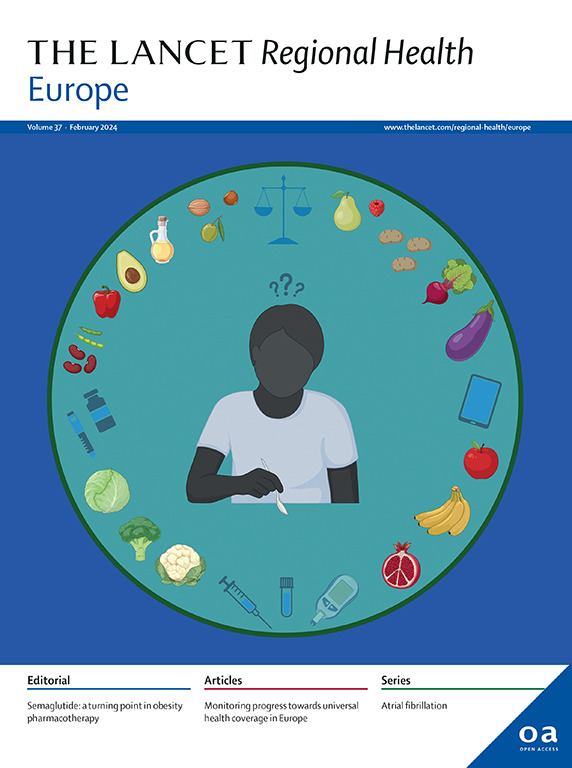寻求庇护者、难民和其他移民人群PTSD、抑郁和焦虑的社会心理干预的比较疗效和可接受性:随机对照研究的系统回顾和网络荟萃分析
IF 13.6
Q1 HEALTH CARE SCIENCES & SERVICES
引用次数: 0
摘要
移民人口出现心理健康问题的风险增加。我们的目的是比较心理社会干预在这一人群中的有效性和可接受性。方法进行系统评价和网络荟萃分析(NMA)。检索Cochrane随机试验中央注册库(Central)、MEDLINE、ptsdbars、PsycINFO、PubMed、CINAHL、EMBASE、Web of Science、Scopus和ClinicalTrials.gov,从数据库建立到2024年10月7日,以确定评估心理社会干预对移民人群减轻创伤后应激障碍(PTSD)、抑郁或焦虑症状效果的随机临床试验。第二代移民的研究如果超过20%的参与者被排除在外。两名独立研究人员筛选、审查和提取数据。主要结局是干预后PTSD、抑郁和焦虑症状的严重程度。次要结局包括可接受性。标准化平均差异(SMDs)和风险比(rr)采用两两和NMA合并。普洛斯彼罗:CRD42023418817。103项研究共纳入19230名参与者,其中96项对至少一个结果进行了荟萃分析,其中女性占参与者的64%。叙事暴露疗法(NET)、咨询、眼动脱敏和再处理(EMDR)和创造性表达干预在减轻PTSD症状方面比常规治疗(TAU)更有效,smd[95%置信区间(ci)]范围为- 0.69[- 1.14,- 0.24]至- 0.60[- 1.20,- 0.01],尽管证据的置信度较低。对于抑郁症状,与TAU相比,综合治疗成为最佳干预措施,具有中等置信度(SMD [95% CI] = - 0.70[- 1.21, - 0.20])。对于焦虑症状,NET、综合治疗和问题管理+ (PM+)/分步治疗(SbS)比TAU更有效,smd [95% ci]范围为- 1.32[- 2.05,- 0.59]至- 0.35[- 0.65,- 0.05]。尽管如此,对证据的信心仍然很低。总体而言,头对头比较产生了不确定的结果,可接受性分析揭示了干预措施之间的差异。16%的研究(17项)被归类为“高风险”偏倚,68%(70项)被归类为“有一些担忧”,18%(19项)被归类为“低风险”。我们发现了相当大的异质性(2 / 70%)。分析显示,与TAU相比,社会心理干预在减轻PTSD、抑郁和焦虑症状方面的疗效没有明显差异。虽然某些干预措施显示出潜在的益处,但对这些发现的信心普遍较低,限制了对其相对有效性得出明确结论的能力。本研究没有得到任何资助机构的特别资助。本文章由计算机程序翻译,如有差异,请以英文原文为准。
Comparative efficacy and acceptability of psychosocial interventions for PTSD, depression, and anxiety in asylum seekers, refugees, and other migrant populations: a systematic review and network meta-analysis of randomised controlled studies
Background
Migrant populations are at increased risk of developing mental health problems. We aimed to compare the efficacy and acceptability of psychosocial interventions in this population.
Methods
We conducted a systematic review and network meta-analysis (NMA). Cochrane Central Register of randomised trials (CENTRAL), MEDLINE, PTSDpubs, PsycINFO, PubMed, CINAHL, EMBASE, Web of Science, Scopus, and ClinicalTrials.gov were searched from database inception to October 7, 2024, to identify randomized clinical trials assessing the efficacy of psychosocial interventions for migrant populations in reducing symptoms of post-traumatic stress disorder (PTSD), depression or anxiety. Studies with second-generation migrants were excluded if they comprised over 20% of participants. Two independent researchers screened, reviewed, and extracted data. The primary outcomes were the severity of PTSD, depression, and anxiety symptoms at post-intervention. Secondary outcomes included acceptability. Standardised mean differences (SMDs) and risk ratios (RRs) were pooled using pairwise and NMA. PROSPERO: CRD42023418817.
Findings
Of the 103 studies with 19,230 participants included, 96 contributed to the meta-analyses for at least one outcome, with women representing 64% of the participants. Narrative Exposure Therapy (NET), counselling, Eye Movement Desensitization and Reprocessing (EMDR), and creative expressive interventions demonstrated greater efficacy than treatment as usual (TAU) in reducing PTSD symptoms, with SMDs [95% Confidence Intervals (CIs)] ranging from −0.69 [−1.14, −0.24] to −0.60 [−1.20, −0.01], albeit with low confidence in the evidence. For depressive symptoms, Integrative therapy emerged as the top intervention compared to TAU, with moderate confidence (SMD [95% CI] = −0.70 [−1.21, −0.20]). For anxiety symptoms, NET, Integrative therapy, and Problem Management Plus (PM+)/Step-by-Step (SbS) were more effective than TAU, with SMDs [95% CIs] ranging from −1.32 [−2.05, −0.59] to −0.35 [−0.65, −0.05]. Still, the confidence in the evidence was low. Overall, head-to-head comparisons yielded inconclusive results, and the acceptability analysis revealed variations across interventions. 16% of the studies (17 studies) were classified as “high risk” of bias, 68% (70) as having “some concerns”, and 18% (19) as “low risk”. We identified considerable heterogeneity (I2 of >70%).
Interpretation
The analysis revealed no clear differences in the efficacy of psychosocial interventions compared to TAU for reducing symptoms of PTSD, depression, and anxiety. While certain interventions showed potential benefits, confidence in these findings was generally low, limiting the ability to draw definitive conclusions about their comparative effectiveness.
Funding
This research received no specific grant from any funding agency.
求助全文
通过发布文献求助,成功后即可免费获取论文全文。
去求助
来源期刊

Lancet Regional Health-Europe
Multiple-
CiteScore
19.90
自引率
1.40%
发文量
260
审稿时长
9 weeks
期刊介绍:
The Lancet Regional Health – Europe, a gold open access journal, is part of The Lancet's global effort to promote healthcare quality and accessibility worldwide. It focuses on advancing clinical practice and health policy in the European region to enhance health outcomes. The journal publishes high-quality original research advocating changes in clinical practice and health policy. It also includes reviews, commentaries, and opinion pieces on regional health topics, such as infection and disease prevention, healthy aging, and reducing health disparities.
 求助内容:
求助内容: 应助结果提醒方式:
应助结果提醒方式:


